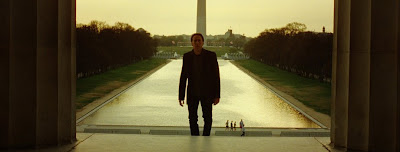
Last month, I asked whether mentioning a certain plot element in National Treasure: Book of Secrets could be considered a “spoiler”, since the plot element in question had been given away — and very explicitly so — in the early trailers for that film. At the time, some of my colleagues said they could not even remember those trailers, so from their point of view it was a “spoiler”.
I was thus amused to read what David Pogue of the New York Times had to say the other day about the trailers for this movie and their relationship to the finished film. He remembers the early trailers very well — so well, in fact, that he got a bit miffed when he saw the film itself and realized it was missing a lot of the footage that had appeared in those earlier trailers.
So now he has written a fun little blog post listing all the bits in the trailers that were left out of the film itself. He concludes:
But this one got me thinking: Just how different can a trailer be without becoming false advertising?
In this case, those lines from Riley made the movie seem funnier than it was, the president’s line made the dramatic stakes seem higher than they were, and the scenes at the Lincoln Memorial made the historical conspiracy seem more ingenious than it was (historical clues hidden right under our noses!). I can say with confidence that some of those elements played a part in my wanting to see the movie.
Rearranging scenes in the trailer is one thing. But what about this business of putting stuff in the trailer — a *lot* of stuff — that isn’t in the movie at all? If they can get away with “National Treasure”-style misrepresentation, what’s to stop other moviemakers from putting special effects, witty lines, exotic locales and hot-looking actors into *their* trailers, just to get us to go to a movie that doesn’t have any of those things?
And if they do start doing that, how will we, the people, ever compare notes and warn each other?
Well, for starters, we the people could stop relying on the ads and start relying only on what critics who have seen the films in advance have to say! Although, sometimes the studios change their films even after showing them to critics; I remember all too well how my review of Kate & Leopold (2001) zeroed in on a scene or two that were deleted from the film just before it came out.
JAN 11 UPDATE: National Treasure director Jon Turteltaub responds — and along the way, he makes a very valid point about trailers reflecting the “essence” of a movie, which is something that he feels the trailer for, say, Sweeney Todd failed to do.












